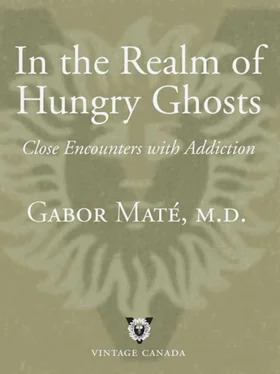In human development the ingestion of food has significance far beyond its obvious dietary role. Following birth the mother’s nipple replaces the umbilical cord as the source of nutrients for the infant, and it is also a point of continued physical contact between mother and child. Proximity to a parent’s body also meets emotional attachment needs that are as basic to the child as the need for physical sustenance.
When infants are anxious or upset, they are offered a human or a plastic nipple—in other words, a relationship with either a natural nurturing object or something that closely resembles it. That’s how emotional nourishment and oral feeding or soothing become closely associated in the mind. On the other hand, emotional deprivation will trigger a desire for oral stimulation or eating just as surely as hunger. Children who continue to suck their thumbs past infancy are attempting to soothe themselves; it’s always a sign of emotional distress. Except in rare cases of physical disease, the more obese a person is, the more emotionally starved they have been at some crucial period in their life.
As a novice family doctor I used to believe that all people needed was basic information. So all I had to do was to teach overweight individuals how excess body fat would overburden the heart, plug the arteries and raise the blood pressure, demonstrating my insights with naïve pencil drawings scratched on prescription pads, and they would leave the office grateful and transformed, ready for a new, healthier lifestyle. I soon found out that they left the office asking for their files to be transferred to some other physician less pedagogically zealous and more understanding about the ways of human beings. I learned that preaching at people about behaviours, even self-destructive ones, did little good when I didn’t or couldn’t help them with the emotional dynamics driving those behaviours.
Invariably, people who eat too much have not only suffered emotional loss in the past, but are also psychically deprived or highly stressed in the present. A woman might leave an unsatisfactory relationship, shed weight and gain confidence, only to become heavy again after going back to her partner. Emotional energy expended without perceived reward is compensated for by calories ingested. Similarly, many people who quit smoking begin to overeat because their craving for oral soothing is no longer eased by their cigarette and the loss of their stress reliever, nicotine, leaves them dopamine-deprived.
If children today are at greater risk for obesity than those of previous generations, it’s not simply because they’re less physically active as a result of being absorbed in TV or computers. It’s primarily because under ordinary peacetime conditions there has never before been a generation so stressed and so starved of nurturing adult relationships. Of course, TV and computers have also become substitutes for the more constant real contact that parents used to provide when they worked near home or on the farm. These sources of entertainment are also used as substitutes for the sense of community formerly provided by large extended families or the clan, tribe or village. Children whose emotionally nourishing relationship with adults gives them a strong sense of themselves do not need to soothe themselves by passively taking in either food or entertainment.
The obesity epidemic demonstrates a psychological and spiritual emptiness at the core of consumer society. We feel powerless and isolated, so we become passive. We lead harried lives, so we long for escape. In Buddhist practice people are taught to chew slowly, being aware of every morsel, every taste. Eating becomes an exercise in awareness. In our culture it’s just the opposite. Food is the universal soother, and many are driven to eat themselves into psychological oblivion.
The roots of sex addiction also reach back to childhood experience. Sex addiction authority Dr. Aviel Goodman points out that the vast majority of female sex addicts were sexually abused as children, as were up to 40 per cent of the men. 1“Human beings are very adaptable,” Dr. Goodman comments. Being held and cuddled is so important to us that we’ll associate love with whatever gives us that warmth and contact. If a person feels wanted only sexually, as an adult she may look to sex to reaffirm that she is loveable and wanted. Sex addicts who were not abused as children may have had more subtle forms of sexualization projected on them by a parent or they may have felt so unloved or undesirable that they now look to sexual contact as a quick source of comfort.
The so-called nymphomaniac, the female sex addict, is not addicted to sex at all, but to the dopamine and endorphin rewards that flow from the feeling of being desired and desirable. Her promiscuity is not perversity but the outgrowth of a childhood adaptation to her circumstances. As with all addictions, sex addiction is a stand-in for nurturing the person was deprived of. The dopamine and endorphin rewards that love is meant to provide are obtained by having sex—but, as with all addictions, only temporarily. The craving for contact is, perversely, accompanied by a terror of real intimacy because of the painful instability of early relationships. That’s why a relationship with a sex-addicted person won’t last. “In a long term relationship you have to face yourself,” says Monique Giard, a Vancouver psychologist with an interest in the treatment of sexual addiction. “It’s very scary and potentially very painful to face one’s deepest fears.” By moving from one partner to another, a sex addict avoids the risk of intimacy, and just as with my constant quest for compact discs, the addict is always seeking the dopamine hit of the novel and the new.
Compulsive sexual roving, like all addictions, serves to help the addict avoid experiencing unpleasant emotions. “It takes a lot of discipline and courage to work through a negative thought and negative emotion,” Ms. Giard points out. “Replacing a negative emotion with a positive one is the core of addictive behavior.” 2
Addictions can never truly replace the life needs they temporarily displace. The false needs they serve, no matter how often they are gratified, cannot leave us fulfilled. The brain can never, as it were, feel that it has had enough, that it can relax and get on with other essential business. It’s as if after a full meal you were left starving and had to immediately turn your efforts to procuring food again. In a person with addictive behaviours, the orbitofrontal cortex and its associated neurological systems have been tricked from childhood onward into valuing false wants above real needs (this is the process we have identified as “salience attribution”). Hence, the desperation of the behavioural addict, the urgency to have that want answered immediately, as if it really were an essential requirement.
In addiction the Rolling Stones lyric is turned upside down: You can sometimes get what you want, but try as you might, you never get what you need.

As prisoner Stephen Reid listens to the story of my infancy during our exchange at the William Head Institution, he shakes his head and looks even more discouraged than before. “But you had these tragic beginnings,” he says, “and yet you’re free. You have a career. I had nothing like that happen to me, and here I am in jail again, where I’ve been most of my life due to my flaws and character weakness—my moral failure.”
I see it differently, and not at all in terms of the harsh judgment Stephen has passed on himself. Apart from the severities we endured in my first year and a half or so, I was brought up in a stable, educated middle-class home by two parents who, for all their human flaws, gave loving, nurturing care to their children and to one another in the long term. Stephen, on the other hand, had a highly stressed and intimidated child for a mother, at least during his early years: he was born to a fifteen-year-old girl who was married to a raging alcoholic. His entire childhood was marked by poverty, shame, fear and emotional insecurity. “If anything disturbed my dad’s world,” he says, “he responded with blind fury.”
Читать дальше













